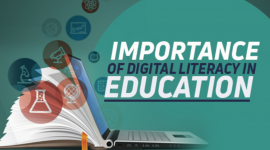It’s not often that you’ll come across an industry as diverse but also fundamentally crucial as education. Higher education is changing. It’s happening right before our eyes. There are some real challenges ahead but also tremendous opportunities waiting to be seized (and some trends to worry about).
Importance of education for professional growth.Higher education is facing disruption caused by technology, demographic and behavioural changes, increased competition, the higher education bubble bursting and other forces. Leaders of universities and colleges need to prepare themselves for this situation in advance. We highlight key trends and challenges to be considered in planning strategic actions up to 2023.
In the past decade or so education in general, and higher education in particular, have been going through major changes. Online learning and the constant growth of digital technologies have made education what it is today. Understanding these key trends should help you formulate your educational business strategy for the coming years.
Supportive student services will evolve.

As per research conducted by boarding schools in Dehradun in particular, today’s students are seeking more flexible, personalized learning experiences that help them connect with their instructors and peers. To meet these demands and stay competitive higher education institutions must evolve their approach to student services.
As students become more comfortable with online learning and look for more value in their education, they’re also becoming more concerned about their success. They want advisors who can provide them with guidance throughout their time at school – not just during their first semester or two.
They want financial aid counsellors who understand how their loans work, not just someone who can tell them how much money they owe after graduation. They want career services specialists who can help them find jobs after graduation, not just someone who can advise them about how to network with alumni in their field of study.
Student services departments will continue to evolve their offerings by offering more support in areas such as career development, mental health, and financial literacy. For example, many institutions are already offering one-on-one coaching sessions with counsellors or career coaches to help students develop job search skills and build confidence for interviews.
In addition, some institutions have implemented self-service tools such as online advising portals. Students can track their academic progress through a dashboard that shows how much time they have left until graduation and what courses they need to take next.
Student health will become a priority for colleges and universities and legislators at all levels of government.
Technology-driven learning experiences gain traction.

Emerging technologies will transform teaching and learning, institutional management, and regional and global innovation ecosystems. Higher education institutions are adopting new technologies to enhance the student experience and improve outcomes. New technologies like artificial intelligence (AI), virtual reality, augmented reality, and blockchain are being used to create more immersive learning environments.
The proliferation of mobile devices and social media has helped drive a shift from passive to active learning models. Students are also using technology to enrich their learning experience. Digital courseware, online tutoring services and online course platforms have become popular in recent years. These tools allow students to access courses anytime and anywhere.
New platforms are offering low-cost alternatives to traditional degree programs and attracting students from across the globe who want access to high-quality education without having to pay for it or move away from home. While this trend appears to be gaining momentum, there are still important challenges to overcome before truly effective AI-driven learning experiences can be created.
Competition for international students intensifies globally.

While there are many opportunities for growth in this sector, the competition for students is intensifying globally. More countries set their sights on becoming major players in higher education. The US remains the most popular destination for international students. However, it faces strong competition from other countries aggressively marketing its higher education systems as affordable and high-quality alternatives to American institutions.
Student mobility is increasing globally and this trend is likely to continue well into the future. This increase is driven by an influx of students from Asia and Africa seeking opportunities abroad.
Entrepreneurship degrees proliferate
Higher education institutions must prepare students for these changes by preparing them to enter a dynamic, globalised workforce where innovation and entrepreneurship are crucial skill sets. In response to this need, colleges and universities are offering more courses on entrepreneurship — and even entire degree programs dedicated to it — which can help prepare students for success.
While entrepreneurship programs have existed for years, there has been a recent surge in demand for these programs. These days there are many more options for students who want to earn an MBA or other master’s degree in entrepreneurship. That’s why many colleges and universities are offering programs that prepare students for careers in business and entrepreneurship.
Focus on soft skills

The need to develop soft skills has been on the rise for some time now, with many companies reporting that they are struggling to find people with the right attitude and aptitude for their jobs. The most successful institutions are focusing on providing students with soft skills that they can use in any industry – such as critical thinking, problem-solving and interpersonal skills – instead of just hard skills like accounting or computer programming.
Soft skills have become increasingly important since they allow students to adapt better when entering new careers or changing industries later in life.
Employers want graduates with hard skills like engineering and accounting but also want employees who can work well with others, communicate effectively, and solve problems creatively.
The push for more fully integrated higher education campuses intensifies and focuses on the student experience.

Higher education institutions are looking to expand their campuses through several means. Student housing, athletic facilities and retail are being built on some campuses, while others are looking at adding satellite locations across the country or in other countries.
At the same time, many institutions are trying to build more fully integrated campuses that offer students not only academic but also social and experiential learning opportunities. These campuses allow students to live on campus, take classes on campus and participate in activities off-campus — all within one campus community.
The higher education industry faces several challenges in the coming years, including rising costs and declining numbers of traditional-age students. However, there are also opportunities for innovation and growth as institutions develop new approaches to student engagement and retention.
The trend toward campus integration continues but at a slower pace than in previous years. Integration is driven by a desire to create more cohesive communities that offer students an enhanced college experience. Looking forward, we will see more focus on how integrated learning environments can be used to enrich teaching and learning experiences.
Faculty and curriculum diversity mandates intensify.
Higher education is preparing for changing student demographics, evolving student needs and expectations, and the growing intensity of global competition for students.
Regulatory pressures are intensifying in the US and elsewhere for colleges to hire more diverse faculty members who can help students learn about the world around them.
This trend is likely to intensify in 2023 as more institutions are required to report on their progress toward achieving gender parity and racial diversity among their faculty. Other schools have been forced to offer an increasing number of courses focused on diversity, inclusion and social justice because of state mandates that require them to do so.
Many colleges struggle to meet these requirements due to a lack of qualified candidates, particularly for positions in STEM fields. Some offer incentives such as free housing or tuition waivers for those who relocate from other states or countries to teach at their schools.
Conclusion
The industry will continue to grow due to technological advancements and increasing demand for educated workers in today’s economy. Higher education institutions must be ready for a major shift from analogue to digital. As online learning becomes more popular and traditional students seek new ways to pay for school, higher education institutions must adapt their business models.
Improving organizational performance will require institutions to redesign their business models and internal structures. The education sector is adapting quickly to meet the demands of today’s economy.
For any queries related to parenting, schooling, or any student-related tips, click here to check out our latest blogs.










